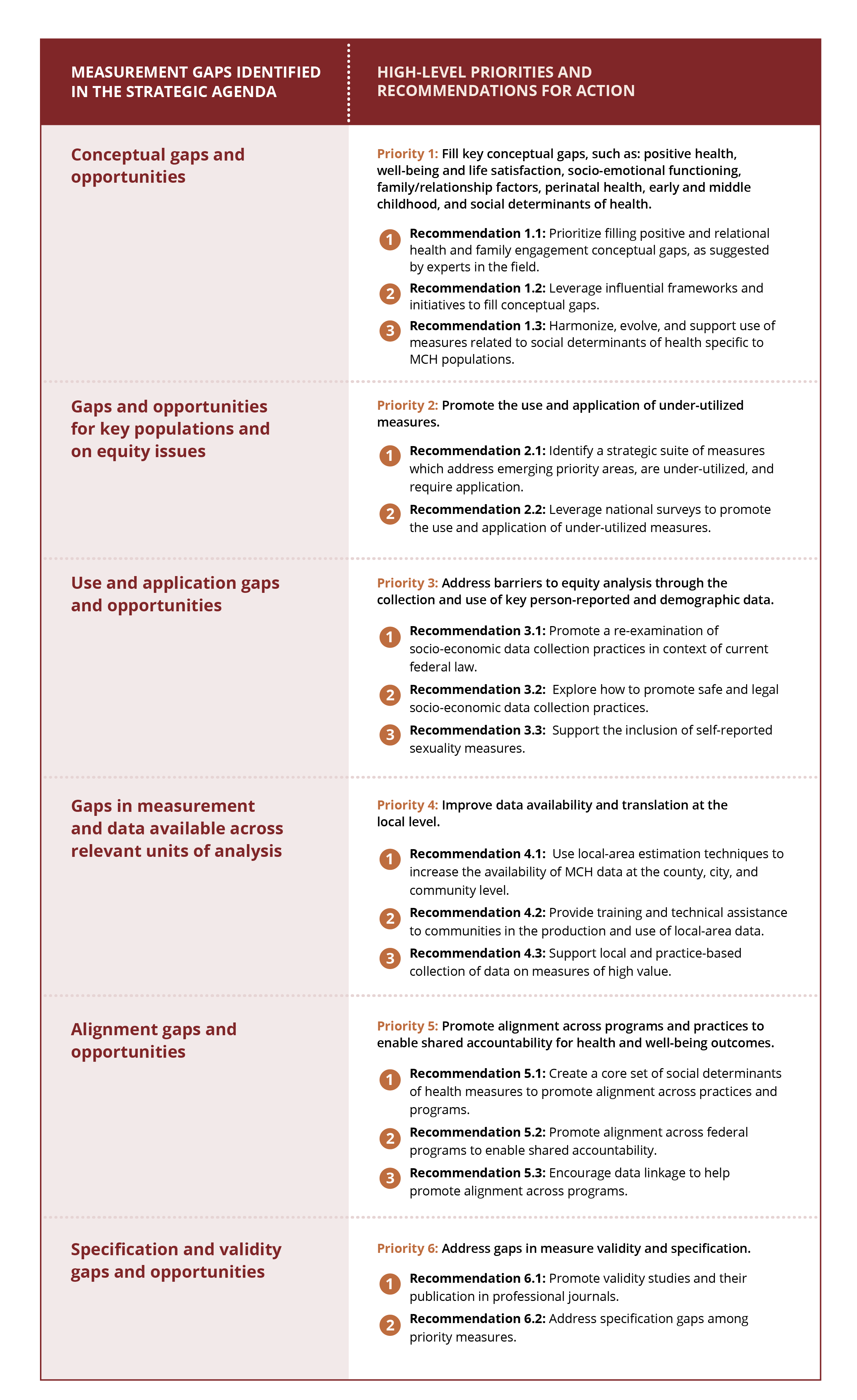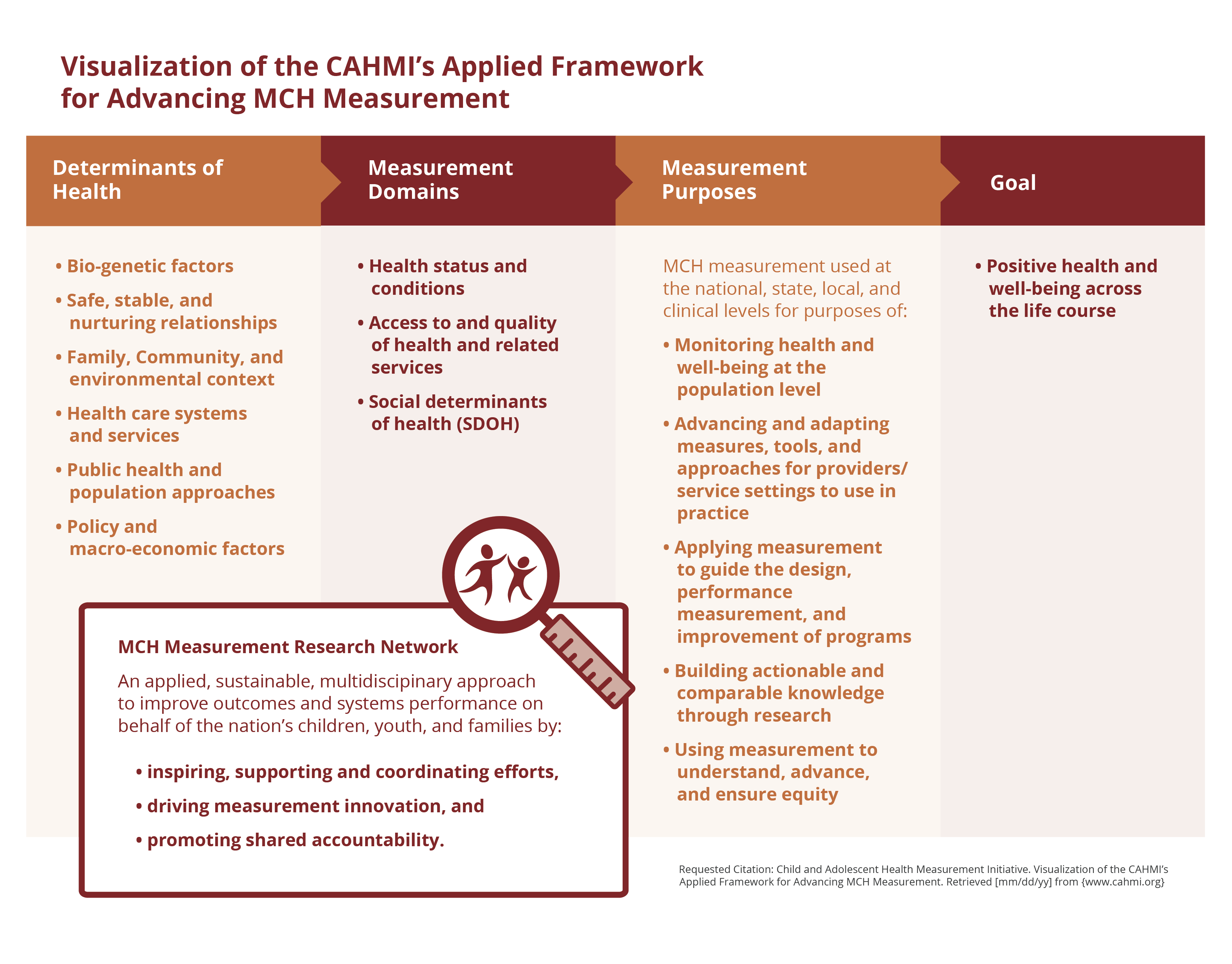To promote early and lifelong health of children and families, we as a nation need to align measures and outcomes with our goals and visions for the future.
As the leader of the Health Resources and Services Administration Maternal and Child Health Bureau (HRSA MCHB) funded Maternal and Child Health Measurement Research Network (MCH-MRN) from 2013-2019, the CAHMI developed and led a systematic
process for creating a Strategic Agenda for measurement and research priorities
and gaps related to maternal, child, and family health.
Learn more about the priority areas, gaps, and recommendations identified in the Strategic Agenda below.
Click on the boxes below to learn more about three priority areas for improving MCH measurement identified by our National Strategic Measurement Agenda and how the CAHMI aims to address them.
Positive and relational health are key to whole child and family health. National well-being and health frameworks are recognizing the importance of positive and relational health, calling out the need for measures related to these key
aspects of health and well-being.
The CAHMI continues to advance measurement research for positive and relational health related to:
- Child flourishing
- Family resilience
- Positive childhood experiences (PCEs)
- Healing-centered strategies to address childhood trauma and adverse childhood experiences (ACEs)
- Parent-child connection
- Co-regulation and biosynchrony
Community and family health and engagement were identified as key conceptual gaps in the strategic agenda. Maternal and child health researchers and experts agree that engaging families and communities in systems of care is critical to
optimizing child health and wellbeing throughout the life course.
The CAHMI works to advance measurement research in these areas related to:
- Community engagement:
- Sense of safety
- Sense of belonging
- Family engagement in practice:
- Developing measures for use in early childhood developmental services to improve family engagement
In order to further the pediatric transformation movement, there is a need to advance a whole-child, engagement-based, actionable, integrated, and equitable measurement and data collection method to be used in well-child care services
and early childhood development. The CAHMI’s Cycle of Engagement model and tools provide this and are currently being improved and refined.
Learn more about the Cycle of Engagement
Measurement Gaps & High-Level Priorities and
Recommendations for Action
The National Strategic Measurement Agenda identified 8 measurement gaps and created 6 priorities and recommendations for actions to close these gaps.

Systematic Process for Creating the Strategic Measurement
Agenda
The National Strategic Measurement Agenda is the result of a multi-step process, including a yearly systematic review of existing measures used across MCH and related programs, expert interviews and continuous use of an ongoing online input
tool, periodically updated environmental and literature scan on existing and emerging measurement frameworks and measures. Learn more about this process in the steps below.
1. Conducted Environmental Scan on Measurement
Frameworks and Measure Sets: Collected qualitative data from a broad range of stakeholders (n=388) with expertise in MCH measurement, research, practice, programs, and policy. Data were collected through:
- In-depth interviews with key informants
- Input forms completed by MCH stakeholders at national meetings
- Listening sessions with state and local MCH leaders
- In-person meetings with MCH-MRN advisors and partners
This environmental scan identified 20 frameworks/models for assessing measurement and 12 national programs and initiatives with measure sets for review.
2. Identified a Framework for Assessing
Impact: Frameworks/models were reviewed based on their relevance to guide conceptualization and measurement of MCH in the US. The CAHMI’s Quality Measurement Framework was utilized to guide the development of a 4-step measure
review process for evaluating the landscape of MCH measurement and identifying gaps and assets. This framework (below) is built around a health care system that values whole child and whole family positive health and well-being throughout
the life course and places value in child health.

3. Measurement Identification and Characterization,
Compendium Creation and Gap Analysis: Using the CAHMI’s Quality Measurement Framework and the results from the environmental scan, a four-part measurement review process was taken. In reviewing and organizing these measures,
the Interactive MCH Measures Compendium was created and a gaps analysis was conducted which identified measurement gaps and opportunities, informing the National Strategic Measurement Agenda.
About the MCH-MRN under CAHMI Leadership
To address the need to focus on measurement, the HRSA MCHB-funded Maternal and Child Health Measurement Research Network (MCH-MRN) was created as a multidisciplinary, collaborative network of experts who are active in the measurement of health
and well-being of MCH populations across the life course. Coordinated by the Child and Adolescent Health Measurement Initiative from 2013-2019, the purpose of the MCH-MRN is to provide a sustainable platform to inspire, support, coordinate,
and advance efforts related to MCH measurement, measurement innovation, and shared accountability to improve outcomes and systems performance on behalf of the nation’s children, youth, and families. Since September 2019, the MCH-MRN
has been under the leadership of Dr. Larry Kleinman of Rutgers University.